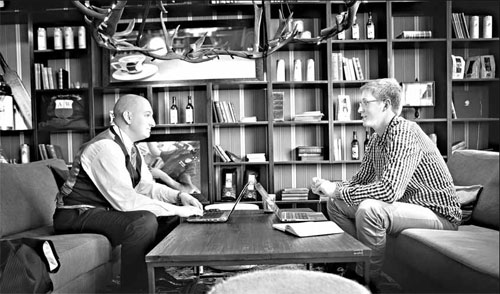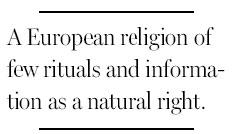In Sweden, file sharing is now sacred
Updated: 2012-08-13 14:00
By John Tagliabue (The New York Times)
|
|||||||||||
 |
|
Isak Gerson, far left, and Gustav Nipe founded the Church of Kopimism, whose adherents believe in the sanctity of sharing information. Gerson, a 20-year-old philosophy student, claims a link to the divine through his smartphone. Casper Hedberg for The New York Times |
STOCKHOLM - People almost everywhere are file sharing these days, using computers to download music or other materials, often ignoring copyrights. In Sweden, file sharing is a religion.
Even as this country, like others in Europe, bows to pressure from big media concerns to stop file sharing, the Swedish government this year registered as a religion a church whose central dogma is that file sharing is sacred.
"For me it is a kind of believing in deeper values than worldly values," said Isak Gerson, a philosophy student at Uppsala University who helped found the church and bears the title chief missionary. "You have it in your backbone."
The religion is called Kopimism - the name comes from a Swedish spelling of the words "copy me" - and claims more than 8,000 faithful who have signed up on its Web site. It has applied for the right to perform marriages and to receive state subsidies awarded to religious organizations, and it has bid to buy a church building, even though most of its activities are conducted online.
"We have something similar to regular priests," said Mr. Gerson, 20, who claims a link to the divine through his smartphone. "There are not that many rituals. We are a tolerant community."
Asked if he believed in God, Mr. Gerson replied: "No, I just believe in our values. It's just a belief in holy values."

The Kopimists rose out of Europe's growing piracy movement, born in Sweden a decade ago. In elections to the European Parliament in 2009, the country's Pirate Party got 7.1 percent of the vote, though in national elections the next year its share plummeted to less than 1 percent.
The movement has spread to at least nine other European countries. In May, Germany's Pirate Party won almost 8 percent of the vote in North Rhine-Westphalia, Germany's most populous state.
But Mr. Gerson, the son of a Jewish father and a Christian mother, insists the church does not sully its hands with politics. "Christianity took from Judaism and turned it into something new, and the Muslims did the same," he said. "We are part of a tradition."
Gustav Nipe, 23, another founder, says Kopimism's purpose is not to directly promote illegal file sharing, but rather to focus on the values of sharing information.
The government has no problem with that, as long as its adherents do not break the law.
"It is our responsibility to register religious communities that fulfill certain criteria," said Mareta Grondal, an official at the agency that registered the church. "We do not look into how communities act in a practical way."
The criteria include writing a charter and paying an annual fee, now about $70.
While Ms. Grondal said that the government "cannot, and should not, interfere with what the people believe in," it shows few signs of allowing religious freedom to justify copyright infringement.
"More and more file sharers are getting busted, especially within the last year," said Anna Troberg, the leader of the Swedish Pirate Party, which has about 8,500 members. "The big movie companies, the big record companies, want someone to go to trial," she said, to act as a deterrent.
Yet, she said, with an estimated two million Swedes involved in file sharing, "It's easier to get hit by lightning than to go to trial."
Still, the trend is clear. In a diplomatic cable published last year by WikiLeaks was a request by the United States Embassy to the Swedish government to stop copyright infringement. A Dutch court in May ordered Internet providers to block the Pirate Bay Web site, which is linked to the Pirate Party, or face large fines, a ruling that will block access to the Sweden-based site for the Dutch. Britain's High Court issued a similar judgment in April.
To Mr. Nipe, it is a "kind of an Inquisition - like burning people."
Many Swedes welcome the Kopimists. If they find a way for artists to benefit fairly from their work without downloaders having to pay, said Jennifer Hallberg, 32, "they deserve a Nobel Prize."
The New York Times
Related Stories
A woman of substance shares the recipe of her success 2012-08-07 09:25
Overseas Chinese in Sweden held culture festival in Stockholm 2012-08-03 10:20
Cancer cases rise with Western lifestyles 2012-06-06 12:10
Simpson to lose weight with lifestyle 2012-06-01 10:28
Youths share pains, gains 2012-05-15 14:54
Today's Top News
Rescuers race against time for quake victims
Telecom workers restore links
Coal mine blast kills 18 in Jilin
Intl scholarship puts China on the map
More bird flu patients discharged
Gold loses sheen, but still a safe bet
US 'turns blind eye to human rights'
Telecom workers restore links
Hot Topics
Lunar probe , China growth forecasts, Emission rules get tougher, China seen through 'colored lens', International board,
Editor's Picks

|

|

|

|

|

|





